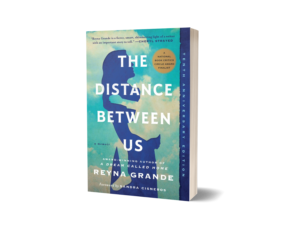On Impostor Syndrome
I’m an award-winning Latina author. At a fancy literary gala, I was mistaken for a waiter.
‘Excuse me, where are the restrooms?’

On the eve of the National Book Festival in Washington, D.C., earlier this year, I attended the author gala held at the Library of Congress. Finding myself in the most beautiful library I’ve ever seen, I stood breathless as I took in its majestic ceilings, ornate walls and marbled staircases.
After I checked in and put on my name tag, I paused on the staircase and looked at the distinguished guests, unable to believe that I was part of an author lineup that included the likes of Barbara Kingsolver, Joyce Carol Oates and U.S. Supreme Court Justice Ruth Bader Ginsburg. I felt grateful, honored to have been invited.
Suddenly, I felt inadequate. The breathtaking beauty of the library became just as intimidating as my distinguished colleagues. I found myself wondering if I belong. I touched my name tag to reassure myself that yes, I was supposed to be here.
As I often do at these kinds of events, I searched the crowd for some Latino faces. Of the 144 authors, I had counted about 13 Latinos in the festival lineup — including two I knew personally, Julia Alvarez and Valeria Luiselli — but I found no familiar Latino faces in the crowd. Most of the Latinos there were part of the waitstaff weaving between the guests with trays of wine and finger foods.
As I made my way into the crowd, a white man stopped me.
“Excuse me, where are the restrooms?” he asked.
“I don’t know,” I said.
He looked confused. Then he noticed my name tag — just like the one he wore — and apologized. “I’m sorry, I thought you were…”
His voice trailed off. He had assumed I was one of the waitstaff.
I’m an author, too, I wanted to say. I belong here, too, but there was still a part of me that wondered if I did.
Insecurity is nothing new to me. After all, I chose a career where Latinos have to fight for our stories to be heard. I’ve been a published author for 13 years and have found success in an industry that suffers from a lack of diversity. I’ve won awards. My books are read in college classrooms. I get invited to give keynote speeches around the country and abroad. And yet I suffer from chronic self-doubt, I worry that I am a fake, that I don’t deserve the success I have found.
There is a name for what ails me: impostor syndrome — the feelings of inadequacy that persist no matter how successful one is.
I’m not alone.
In today’s political climate, Latinos’ collective feelings of inadequacy have gotten worse. The message that we’re not good enough, that we don’t belong here comes at us from all directions — starting at the top with our own president constantly disrespecting and demeaning our community. It comes from being left out of popular culture, from Hollywood to the publishing world. It comes at us when our one Latino presidential candidate, Julián Castro, is held to a different standard than his white running mates. It comes from being yelled at by strangers for speaking Spanish or being pulled over by the police because of the color of our skin. It comes when we are made to feel uncomfortable for daring to occupy spaces not usually meant for us, like a fancy literary gala.
The overall publishing industry is 79 percent white. When you break it down to look at those in the editorial department of publishing houses, 82 percent are white. So it’s no wonder then that last year, only 5 percent of children’s books published had a Latino character compared to the 50 percent that featured white characters. At 27 percent, even animal characters were featured more in children’s books than a Latino.
But it isn’t just in the publishing industry that Latinos are invisible. In all sectors of society, Latinos are severely underrepresented, erased and ignored:
In the film industry, in the past 11 years, only 4.5 percent of speaking roles have gone to Latino actors. Things are just as bad behind the camera, with only 4 percent of directors being Latino.
In politics, the numbers are just as dismal. There are only 36 Latinos in the House and four in the Senate, yet Latinos are almost 18 percent of the U.S. population.
Latinos are also underrepresented in higher education, with only 21 percent of us holding a bachelor’s degree. In California where I live — though Latinos are the largest single ethnic group in the state — only 11 percent of Latino adults hold a bachelor’s degree, compared to 48 percent of Asians and 39 percent of white people.
Latinos face a lack of opportunities and structural support, but despite those challenges, some of us do manage to get past the gatekeepers and end up in spaces that were built to keep us out. It is intimidating and frightening to claim that space and to fight for our right to remain. So even to this day, despite my success, when I walk into those spaces, I still feel like an impostor.
Even though I was being honored at the Library of Congress, I felt the same way I did on the first day I arrived at the University of California at Santa Cruz to begin my journey as a writer. With only 13 percent of the student body being Latino, I struggled to claim my seat at the table, to feel that I was as qualified as anyone else to be in my writing classes. As a first-generation college student who came from a low-income household and was a formerly-undocumented immigrant, I had a long battle to fight to become a writer. After all, I was trying to make a career in an industry where people like me didn’t exist.
I had to write my way into existence.
Now here I was, at the Library of Congress, trying to claim that space for my people, yet again facing my feelings of inadequacy.
But then, something magical happened.
Dinner was served and to my surprise, the offering that night was tacos. I stared at the trays of food before me and laughed.
Of all the things they could have served, they chose Mexican food.
As I watched the tacos being enjoyed by all the distinguished guests — all of us under the fancy ceiling of the library — I realized that if tacos belong at the Library of Congress, so do I.

